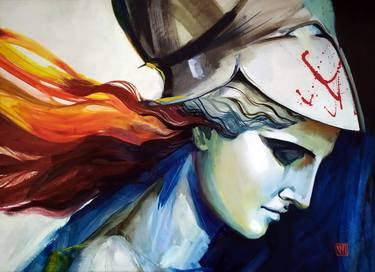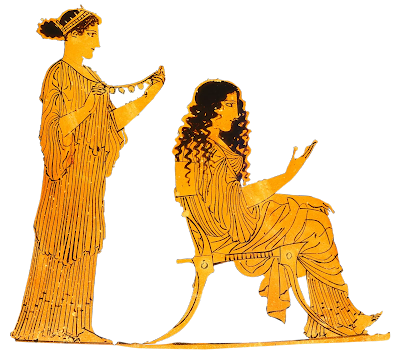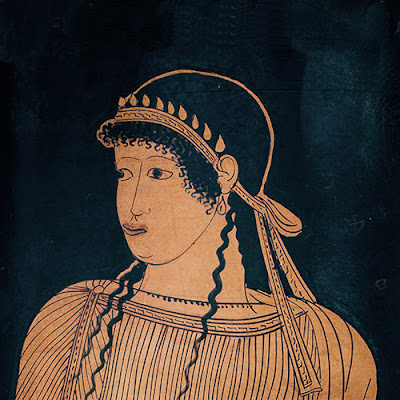The handout I gave you in class on Wednesday is pasted in the questions below, in case you lost your copy (or left it behind in class!). It might prove useful in future discussions or exams/assignments!
NOTE: The questions 2 & 3 I posted on Friday were accidental--they go to later books of The Odyssey. I posted new questions for these books, so because I goofed, you can have extra time to answer the questions.
Answer TWO of the following:
Q1: Calypso is yet another "evil woman" in ancient
literature, though Homer offers a much more nuanced portrait of her motives.
How does she respond to the gods’ requests to relinquish her hold on Odysseus? Why
might Sappho have agreed with (or even written herself!) her rebuttal speech to
Hermes?
New Q2: The poem is full of "bonus material," including little songs (placed in italics in the book) and songs from professional bards/poets, such as the story about Ares and Aphrodite in Book 8. Why do you think Homer includes these little asides, which have nothing to do with the plot itself? How does it enrich our reading of the story?
New Q3: In these books, it seems that every woman whether mortal or immortal is desperate to help Odysseus escape an evil fate. Circe, Nausicaa, Athena, and Ino (a water goddess) all line up to help him make it to safety in the land of the Phaecians. But Odysseus, rather than thanking them, seems to think they're all plotting against him, as he remarks of Ino, "Not this. Not another treacherous god/Scheming against me" (40)? Why do you think this is? Why doesn't he realize the goddesses are in his corner?
Q4: Since The Odyssey was originally an oral poem, we get
a lot of repetition (which would help the poem memorize such an epic work). What
are some of the repetitions of phrases or scenes that continually reappear in
the work? Besides as an aid to memorization, why do you think the poem includes
these echoes? How might they also help readers of such a long and complex work?
The Odyssey: Translating “Polytropos”
(many turns/twists)
“Andra, the first word
in The Odyssey, announces a poem about a ‘man,’ and in some ways, this
is story about Man without exception. The protagonist’s quest for knowledge,
his travels, his suffering, and his determination to return to his wife and
child are all themes of universal significance: the Odyssey, like The
Iliad, seeks to define what it means to be human. But the Odyssey is
also the story of one, very specific, and very puzzling man. It is difficult to
know what to make of him, or even pinpoint his identity: as the poem builds up,
line after line, we are given several details about its protagonist, but we are
never told his name. That we are dealing with an Odyssey, a ‘poem about
Odysseus,’ is therefore something we have to work out for ourselves as we
listen to the poet” (Graziosi, Homer).
FIVE TRANSLATIONS OF THE OPENING LINES
(1) “Speak, memory—of the cunning
hero,
The wanderer, blown off
course time and again
After he plundered Troy’s sacred heights” (Stanley Lombardo)
(2) “Tell me, Muse, the story
of that resourceful man who was driven to wander far and wide after he
had sacked the holy citadel of Troy.” (E.V. Rieu)
(3) “Tell me about a complicated
man.
Muse, tell me how he wandered
and was lost
when he had wrecked the holy
town of Troy.” (Emily Wilson)
(4) “Sing to me of the man,
Muse, the man of twists and turns
driven time and again off
course, once he had plundered
the hallowed heights of Troy” (Robert Fagles)
(5) “The man for wisdom's
various arts renown'd,
Long exercised in woes, O Muse! resound;
Who, when his arms had wrought the destined fall
Of sacred Troy, and razed her heaven-built wall” (Alexander Pope)







